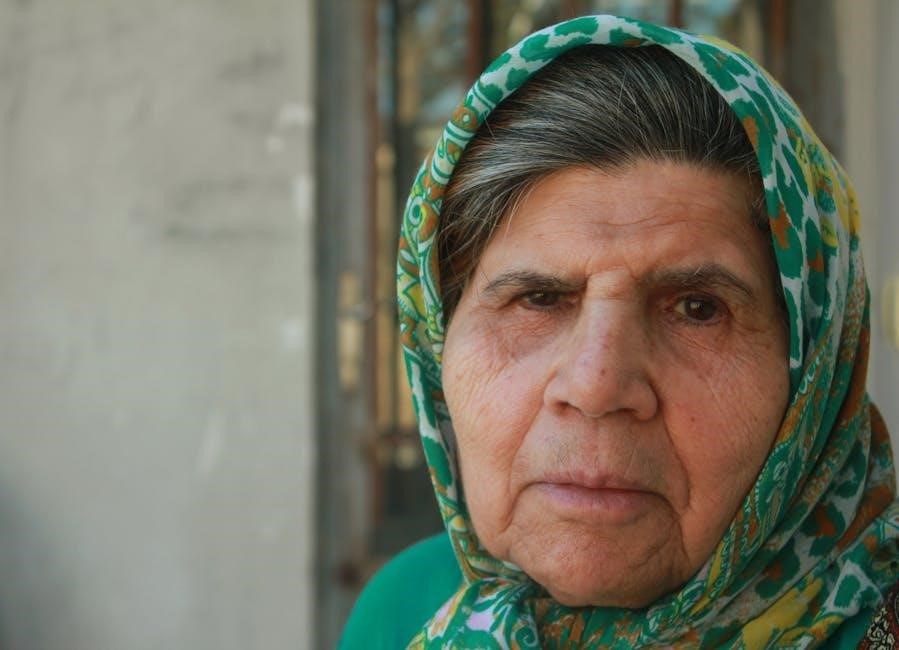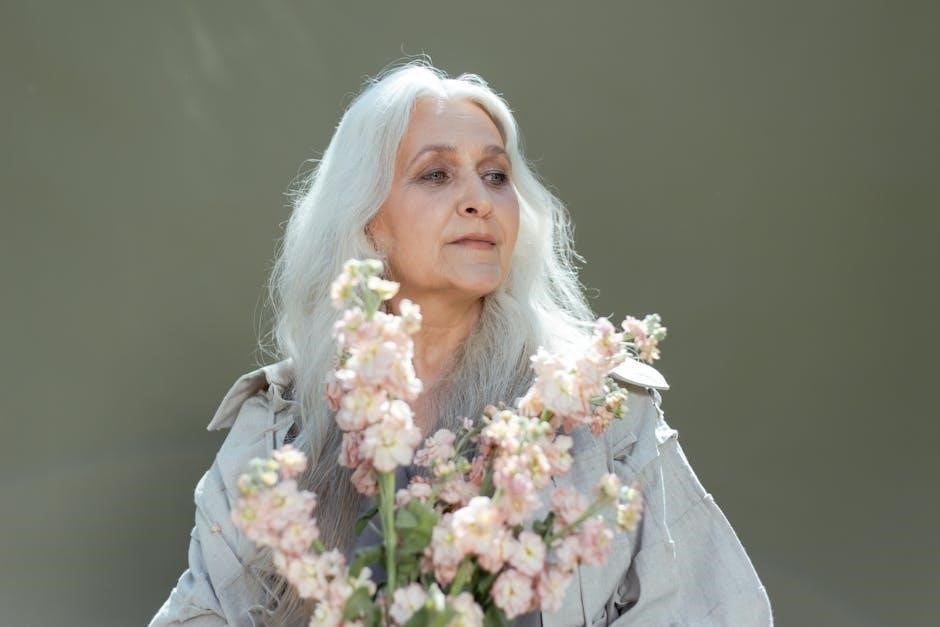aging with grace pdf

Aging with grace involves surrendering to life’s changes, accepting losses, and finding hope through faith. The Nun Study reveals how purposeful living and joy contribute to longevity and well-being.
Understanding the Concept of Aging Gracefully
Aging gracefully is rooted in surrendering to life’s natural changes and embracing them with dignity. It involves acknowledging losses, expressing grief, and finding hope through faith or support systems. The Nun Study highlights how purposeful living, joy, and a positive outlook contribute to longevity and well-being. Surrendering to aging’s realities fosters resilience, allowing individuals to navigate life’s challenges with grace. This mindset encourages accepting life’s uncertainties while clinging to hope and meaning. By prioritizing values and preparing for life’s transitions, one can age gracefully, finding fulfillment even in life’s later seasons. This approach emphasizes emotional and spiritual growth, transforming aging into a journey of deeper purpose and peace.
The Importance of Surrender and Acceptance
Surrender and acceptance are pivotal in aging gracefully, allowing individuals to embrace life’s transitions with dignity and peace. Recognizing and grieving losses is essential. Surrendering to aging’s realities fosters resilience, helping navigate life’s uncertainties. Acceptance reduces resistance to change, promoting emotional and spiritual well-being. By letting go of control and trusting in a higher purpose, one finds hope and meaning. This mindset transforms aging into a journey of growth, emphasizing living joyfully and purposefully. Acceptance enables individuals to cherish moments and focus on what truly matters, fostering a graceful and fulfilling life.

Key Concepts from the Nun Study
The Nun Study highlights the impact of genetics, lifestyle, and cognitive function on aging, revealing how purposeful living and joy contribute to longevity and well-being.
Lifestyle Factors Influencing Longevity and Health

Research from the Nun Study emphasizes the role of lifestyle in promoting longevity and well-being. Activities that bring joy, mental engagement, and a sense of purpose are crucial. Regular physical activity, a balanced diet, and strong social connections also contribute to healthier aging. The study highlights the importance of embracing changes while staying proactive about health. By prioritizing meaningful pursuits and maintaining a positive outlook, individuals can cultivate resilience and thrive in their later years. These findings underscore the transformative power of intentional living and self-care in the aging process.
Cognitive Health and Its Role in Aging
Cognitive health plays a vital role in aging gracefully, as highlighted by the Nun Study. Research shows that engaging in mentally stimulating activities, such as reading, writing, and problem-solving, helps maintain cognitive function. A positive outlook and a sense of purpose are also linked to better brain health and a lower risk of age-related cognitive decline. The study emphasizes the importance of staying mentally active and fostering a resilient mindset to navigate life’s challenges. By prioritizing cognitive engagement and embracing a meaningful lifestyle, individuals can preserve their mental clarity and continue to thrive as they age. This approach not only enhances quality of life but also supports overall well-being during the aging process.

Learning to Surrender
Surrendering involves accepting life’s changes and releasing resistance to what cannot be controlled. It fosters peace and hope, aligning with faith and grace during aging.
Acknowledging Losses in the Aging Process
Acknowledging losses is a cornerstone of aging with grace, as it allows individuals to process emotions and embrace life’s transitions. Recognizing what has changed, such as physical abilities or social roles, helps in accepting the natural progression of life. Expressing grief, whether to a trusted friend, family member, or spiritual advisor, fosters healing and peace. The Nun Study highlights how those who maintain a positive outlook despite losses often experience greater fulfillment. Surrendering to these changes, rather than resisting them, aligns with the concept of aging gracefully. By acknowledging losses, individuals can refocus on what truly matters, fostering resilience and hope in their journey.

Expressing Grief and Finding Hope
Expressing grief is a vital part of aging with grace, as it allows individuals to confront and process their emotions. Acknowledging loss and surrendering to life’s changes fosters resilience and hope. The Nun Study highlights how those who maintain a positive outlook despite hardships often find deeper fulfillment. By expressing grief to God or trusted others, individuals can experience emotional healing and gain perspective. This process of surrender and acceptance enables them to refocus on what truly matters, nurturing spiritual growth and hope. Aging gracefully involves not just enduring losses but transforming them into opportunities for meaningful reflection and renewal.

Maintaining Cognitive Health

Mental engagement and lifestyle choices significantly impact cognitive health. The Nun Study emphasizes the role of genetics and environment in preserving brain function and clarity as we age.
Strategies for Mental Engagement

Maintaining cognitive health requires intentional strategies to stay mentally active; Engaging in hobbies like reading, puzzles, or learning new skills can stimulate the brain. Volunteering or mentoring others provides purpose and mental stimulation. Regular social interaction and meaningful conversations also play a crucial role in preserving cognitive function. Incorporating activities that challenge the mind, such as learning a new language or practicing a musical instrument, can foster resilience against cognitive decline. Additionally, staying curious and open to new experiences encourages continuous mental growth. These practices, supported by a positive outlook, help individuals age with grace and maintain their intellectual vitality throughout life.
The Role of Genetics and Environment
Genetics and environment significantly influence aging and cognitive health. The Nun Study highlights how lifestyle factors, such as diet, exercise, and mental stimulation, can mitigate genetic predispositions. Environmental factors like social support and access to resources also play a role. While genetics provide a foundation, it is the interplay with environment that shapes overall well-being. Positive lifestyle choices can enhance resilience, promoting healthier aging despite genetic risks. Understanding this balance empowers individuals to make proactive decisions, fostering grace and vitality in later life.

Practical Tips for Aging Gracefully

Engage in joyful activities, challenge your brain, and embrace changes while monitoring health. Stay active, prioritize values, and seek care when needed to age gracefully.
Staying Active and Engaged
Staying active and engaged is crucial for aging gracefully. According to the Nun Study, purposeful engagement in activities brings joy and contributes to longevity. Regular physical exercise, mental stimulation through puzzles, and staying socially connected are key strategies. Engaging in hobbies, volunteering, or learning new skills helps maintain cognitive health and fosters a sense of purpose. Embracing changes with resilience and staying mentally active are essential for a fulfilling life. By prioritizing these practices, individuals can navigate aging with grace and vitality, ensuring a meaningful and joyful journey.
- Engage in physical activities to maintain mobility and strength.
- Pursue hobbies and interests that bring fulfillment.
- Stay socially connected to build resilience and support.
Navigating Changes with Resilience
Navigating life’s changes with resilience is essential for aging gracefully. Embracing a positive outlook and accepting life’s transitions helps individuals adapt to challenges. Loss of control is inevitable, but surrendering to these changes fosters peace. Reflecting on personal values and priorities ensures alignment with meaningful goals. Seeking support from loved ones or faith communities strengthens resilience. Learning to reframe challenges as opportunities for growth promotes emotional well-being. The Nun Study highlights how nuns’ ability to navigate life’s difficulties with grace was rooted in their purposeful living and joy. By cultivating resilience, individuals can embrace aging as a journey of hope and transformation, leading to a more fulfilling life.
Aging with grace is a journey of embracing life’s changes, finding hope, and living meaningfully. It encourages surrender, resilience, and faith, leading to a fulfilling legacy.
Embracing the Journey of Aging
Aging with grace is not just about enduring life’s challenges but embracing them with purpose and joy. The Nun Study highlights how nuns’ longevity and health stem from a sense of meaning and fulfillment. By surrendering to life’s changes and finding hope in faith, individuals can navigate aging with resilience. This journey encourages embracing losses, expressing grief, and discovering new ways to live meaningfully. It’s about accepting the natural progression of life while staying active, mentally engaged, and connected with others. Aging gracefully is a mindset that values every moment, emphasizing the importance of joy, purpose, and faith in creating a legacy of love and wisdom for future generations.
Final Thoughts on Living Meaningfully
Living meaningfully in aging involves embracing a life of purpose, joy, and faith. The Nun Study underscores the importance of cognitive health and a positive outlook. By challenging the mind and staying active, individuals can thrive. Acceptance and surrender are key to navigating life’s transitions gracefully. Aging with grace is about finding hope in every season, reframing losses, and living intentionally. It encourages a holistic approach to health, blending genetics, lifestyle, and mental engagement. Ultimately, meaningful living in aging is about leaving a legacy of love, wisdom, and resilience, inspiring future generations to embrace life’s journey with grace and hope.